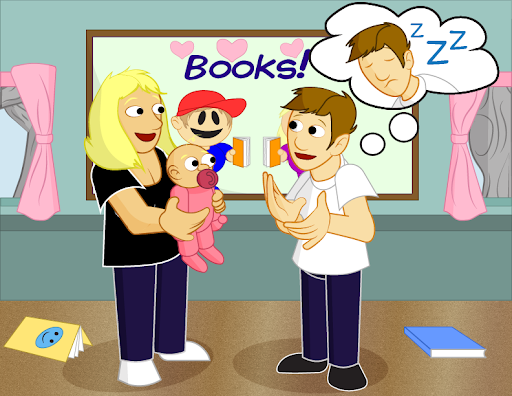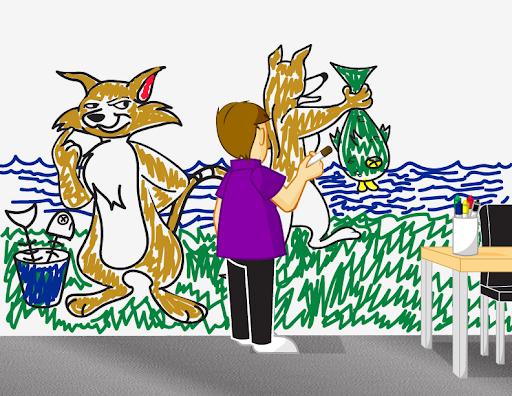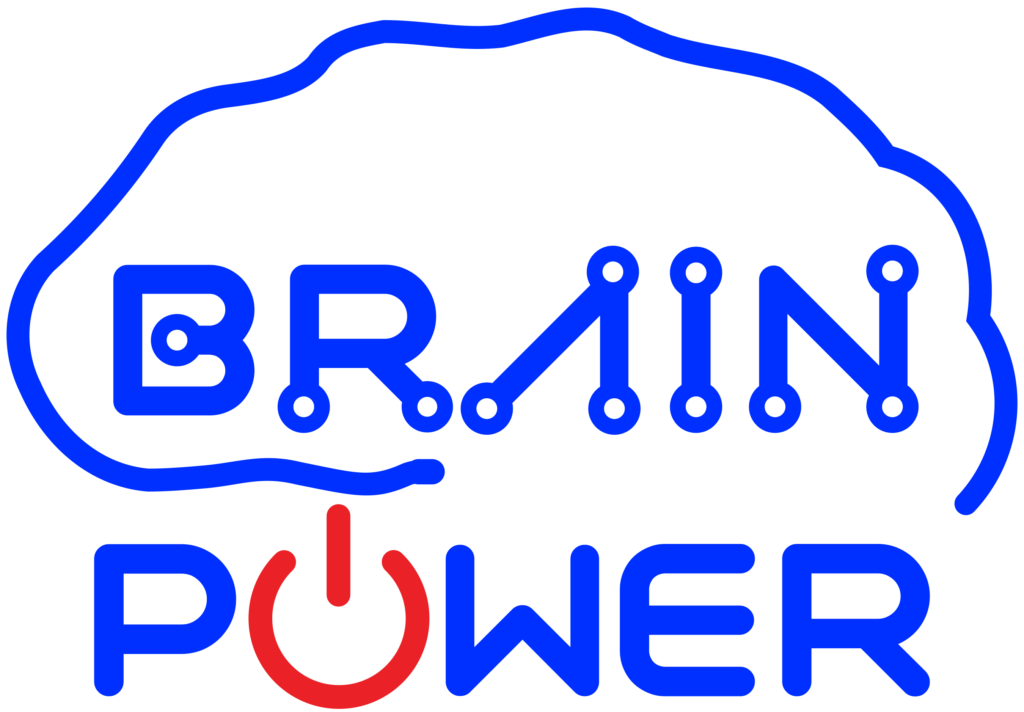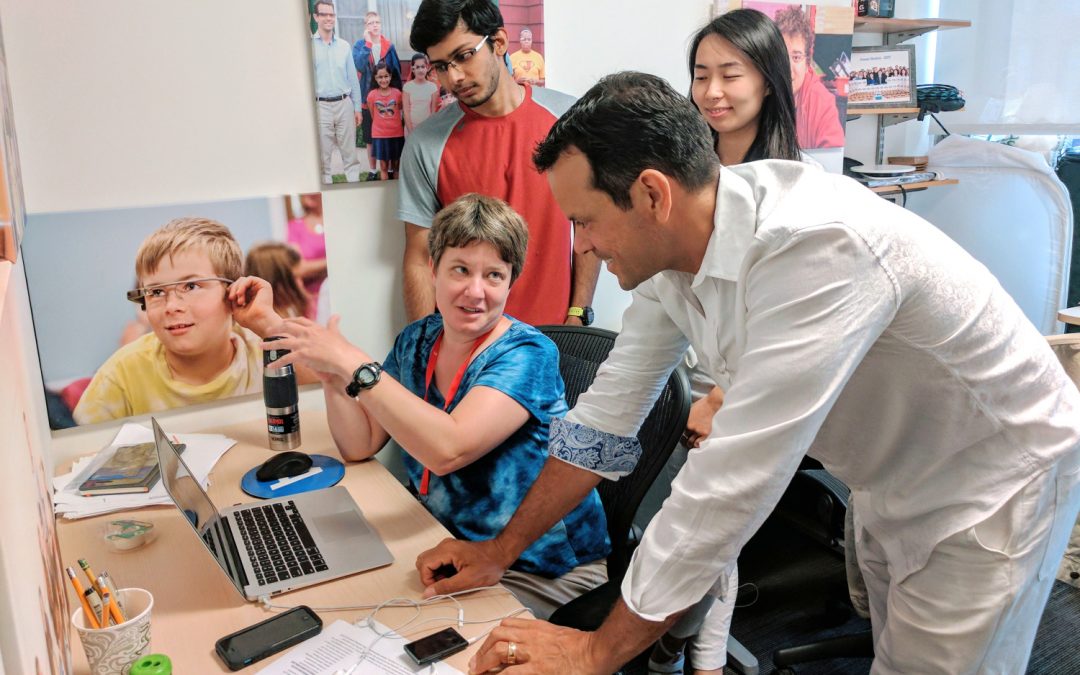(Editor’s note: Our animator, Julie Esris, wrote this post shortly after she was hired by Brain Power in 2017. All drawings in this post below were created by her! She continues to create amazing artwork and animations for us.)
All I can say is, “Thank God I’ve found this job.”
This is the phrase I almost always utter when telling family, friends, acquaintances, and even total strangers about landing work at Brain Power. The desperate overtone in my words is not an accident. Nor is it me being melodramatic. It’s a reflection of the struggles I endured for 14 years while trying to gain meaningful and lasting employment.
Since the day I graduated from college in New York City in spring 2003, being “between jobs” was a chronic reality. It didn’t help that I did my undergraduate degree in animation — a highly competitive and low-demand field, in a post-9/11 economy no less. But as time passed, I began to realize that my area of study was only a small part of the reason I did not yet have a career. It was not the only reason why I struggled to obtain work and pay that was reflective of having obtained a Bachelor’s Degree, not to mention my intelligence, drive, and ambition. I watched as my classmates — even the ones who did not end up working in art-related fields — eventually found jobs that paid the bills and gave them meaningful work. More importantly, it also gave them an adult identity.
Indeed, a question I almost invariably encounter when meeting new people is, “What do you do?” an inquiry that is considered rude in many other western countries. I cringed whenever people asked me this question, not because I didn’t have meaningful work and a livable salary, or even because I didn’t have this part of an adult identity established. It was because it was a constant reminder of something that I had figured out even before I graduated from college, something that has been backed up by research: that having a certain savoir faire — that is, the ability to speak and behave “appropriately” in social situations — is the best predictor of getting in the door, not to mention a successful career. As someone who grew up with undiagnosed Asperger’s Syndrome and who came of age in the twilight of the 20th century when “autism spectrum” was not a well-known term (or even one that I had heard of), I didn’t have the benefit of the special education and accommodations that today’s children are afforded to facilitate their transition into adulthood. Every day was a reminder that, because of who I am, I was not living the type of adulthood society expects.
Early Struggles
While I continued creating artwork in my spare time, the first five years after graduating college included several dead-end jobs in Brooklyn, some with deplorable work conditions: the job at the rat-infested book warehouse with no heating, except for the office of my ill-tempered, overtly racist boss; the stint at the auto transport company with the owner who swindled customers and left me to deal with their complaints; the three-year coma at the small telephone company whose idea of assigning me a “project” was asking me to call 800 former customers and find out why they switched to another provider; and a number of jobs that lasted anywhere from a few days to a few months either because they were temp jobs, because the company was losing money, or simply because I wasn’t “what [they] were looking for.” Employers rarely elaborated.

Seeking employment that required more, well, brainpower also required more experience. If I was lucky enough to land an interview with a job that sounded promising, I was not hired or even called in for a second interview. Their reasons for not giving me further consideration ran the gamut from my lack of experience to my being “overqualified”; sometimes I was also given the vague, “We’re not sure you’re what we’re looking for.” I always wondered if there was something they weren’t telling me. I knew that what my parents had told me about my undergraduate degree being in a niche field interfering with my employability was a red herring. It became excruciatingly clear that to get a good, rewarding job, I would have to be a social butterfly; a nurturing, outgoing “people person”: someone I’m not.
Somehow it didn’t cross my mind how important said skills would be when I went back to school for library science to train to be a children’s librarian. I imagined a job in which I could use my creative skills, such as teaching children how to draw in after-school and summer programs. Although I enjoyed a one-and-a-half-year volunteering stint working with disadvantaged children at a New York City library, it became increasingly obvious when I got my first full-time job as a children’s librarian in 2013 that this line of work was not for me. I found it exhausting to pretend to be interested in a parent’s story about little Caleb saying his first word. I found it difficult to keep up a natural conversation with Mommy about little Emma’s food allergies. And I knew it sounded forced when I told a parent that their E.T.-like newborn was “cute.” I like children because they are fun and interesting. But much of working as a children’s librarian was about working with the parents and passing a test laden with unspoken rules. In fact, when talking with the parents, I felt my mind was flipping through a Rolodex, looking for the Right Words and the Right Tone. And I think they knew that.

Once again, I was back to square one: more temp jobs and more fielding the unanswerable “What do you do?” The only fields that I felt talented in were visual arts and creative writing, and there was no way I could make a living with these skills unless I managed to publish a bestselling book or graphic novel, and I did not have the financial luxury to make such gambles. On top of that, my patchwork employment history likely aroused the suspicions of potential employers. Very few people realize that someone may not have a solid work history for reasons that have nothing to do with, for example, being lazy, being chronically absent, or fighting with coworkers.
It Was Never Easy
In the summer of 2015, my brother told me about a web development boot camp that he thought I should look into. My brother is a web developer and knows the industry well; he told me it could be the perfect environment for me because it’s a field that requires intelligence with very little emphasis (if any) on social finesse. I registered for the class and found myself to be in over my head; I struggled to understand the work and could not keep up. After just three weeks, I dropped the class, enrolled in two part-time prep classes, and re-enrolled in the boot camp at the end of the following summer. The prep classes helped me prepare for the first unit, but after that I battled with a 90-degree learning curve and just barely passed the class. Except for the moments during breaks when I would draw some of my cartoon characters on the whiteboard to make my instructors laugh, I found myself under inordinate stress.
I utilized the outcomes program offered by the school to help me find work. To continue accessing these services, each week I was required to send applications to at least ten companies and also attend two networking events. I knew from the day I began my search that I was just going through the motions without any real hope of getting hired. I found myself unable to learn any new material on my own and thus unable to create any new projects. Additionally, all of the companies that I applied to required knowledge of a variety of web development frameworks, but I barely understood any of it, and the learning curve was, as usual, beyond steep.
After five months, I was the only remaining graduate from my class who did not yet have a job. The outcomes coordinator at the school gently informed me that they could no longer include me in the outcomes program and urged me to find a tutor. Once again, I was stuck.
This new development took a severe toll on my self-esteem: everybody I knew had a career, was financially independent, and had an answer to the ubiquitous question “What do you do?” On top of that was another source of humiliation: Many of my Facebook friends are former campers from a summer camp that I worked at in the early 2000s. These people are between ten and 12 years younger than me, and most of them have job titles indicative of a solid career path listed in their Facebook profiles. Now 36 years old, I felt that I wasn’t even meeting the expectations of a 23- or 24-year old.

Something else became even more apparent: to have a successful career, you either have to have pristine social skills or serious STEM skills. And I had neither. I thought about how people on the autism spectrum are typecast as being computer geniuses. I have read, however, that they are generally cognitively stronger in verbal areas, often to the point that they, like me, meet the criteria for nonverbal learning disability. Why, then, the stereotype? My hypothesis is this: If it’s true that one with social skills issues has to be strong in technical fields to live independently, then the only people on the autism spectrum we are hearing about are the ones who are strong in said fields. The rest are likely living with their parents, are financially supported by them, or are otherwise struggling. Fields that require strong verbal skills are generally either very competitive (bestselling author) or require superior social skills (a teacher). What in the world was I going to do?
Finding Brain Power
To my great surprise, a few weeks after being told that I was being removed from the outcomes program at the school where I took the web development class, the head of outcomes contacted me. She told me about Brain Power, a company that makes a wearable headset for people on the autism spectrum, and they were looking for a full-stack web developer. She knew that I was on the autism spectrum, had a Bachelor’s degree in animation, was prone to drawing on the whiteboard, and had strong writing skills. The job as a full-stack web developer was obviously out of the question; instead she told me to contact the company and show them my artwork and writing. I said I would do it, but I was very skeptical that a tech company would care about these things — no company ever had before. Additionally, the head of outcomes informed me that there was an event coming up called “Neurodiversity in Tech” and encouraged me to attend. I almost decided not to go because I was becoming increasingly fed up with the stereotype that people on the autism spectrum are computer programming geniuses when I did not fit that profile.
It turned out that a couple people from Brain Power were present at the event. I met with one employee and told him my story, offering myself as someone who could produce artwork and writing for the company. I gave him my business card — which had a cartoon drawing of my cat on it — and he promised he would pass it on to the head of the company, Dr. Ned Sahin. Meanwhile, I wrote an email to Ned, telling him who I was and what I could do. To my great surprise, Ned expressed interest. I came in for an interview in late spring. For the first time ever in an interview, I could be honest about who I was and what I was interested in, where my skills truly are, and why I had such a muddled work history. I didn’t have to fib, omit details, or otherwise stretch the truth. I was in the interview for an hour and a half, and Ned and others showed great interest in my artwork and writing. Ned asked me if I would be willing to learn Adobe Illustrator. I said I would.
Toward the end of May, I was offered the position of a graphic artist at Brain Power. Ned said that he was very impressed by my work, felt that I had a lot to offer, and that the company could learn something from me. The latter is something that no employer has ever said to me before.
It has since been a little more than two months since I have begun working at Brain Power. I have since learned Adobe Illustrator and have created dozens of illustrations and graphics for Brain Power’s apps and documents. The environment at Brain Power is like nothing else I have ever experienced: it’s a company that includes people who don’t fit in anywhere else. It is professional, yet informal. Yes, we are expected to dress a certain way, but we are also allowed to listen to headphones while we work so long as the type of work we do (working in Illustrator, in my case) is conducive to this activity. Of course we are expected to be civil to one another, but an awkward or otherwise atypical interaction, tone, or posture is met with understanding, not water-cooler gossip. The most important aspect about working at Brain Power is one’s diligence, willingness to learn, and enthusiastically contributing to a company product.
One unique aspect about Brain Power is the fact that it actively prioritizes hiring autistic people. I have found it incredibly frustrating that while there are many resources for children on the autism spectrum, the services for adults are lacking. Autistic children become autistic adults, a fact that society seems to forget. And these adults often have difficulty obtaining and keeping employment. Part of Brain Power’s mission is to employ these adults who, like me, have had difficulty with employment in the past. Everybody at Brain Power knows I am on the autism spectrum, and I have told them that like many other autistic people, I have extreme difficulty recognizing faces. If I ask somebody their name several times, they are not insulted and they do not speculate about what could be “wrong” with me. These things are part of who I am and ultimately irrelevant to the job.
And finally, professional experience is not necessarily the most important quality for being hired at Brain Power. After all, if one is on the autism spectrum, it’s very possible they have limited or no professional experience. Despite having attended art school, I have never had a job in an art-related field. My raw talent was enough to land me a position in Brain Power. I’ll say it again: Thank God I’ve found this job.
There is no place I’d rather work.
(Check out our careers page to see if there’s a place at Brain Power for you, too!)



Recent Comments